María Castro Domínguez's Blog, page 4
January 18, 2016
Poem “Riddle me this” by María C. Domínguez in The Tower Journal today
Here´s some biographical details of both Mary Ann Sullivan and Allison Joseph.
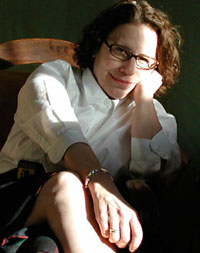
Mary Ann Sullivan is the author of the middle grade book, Child of War (Holiday House, 1984), which was named a Notable Book in Social Studies by the National Council of Social Studies and Children’s Book Council; a collection of poems, Hermit Day, and numerous digital poems such as “St. Damien of Molokai” and “Shaking the Spiders Out.”An e-collection of poems she wrote when she was a cloistered nun, Mending My Black Sweater (Eratio, 2008) can be found at eratio.
The New York Times called her book, Child of War, set in Belfast, Northern Ireland an “earnest first novel.”
A former cloistered nun, Mary today teaches undergrads writing at St. Joseph School of Nursing and Great Bay Community College. She also teaches Fundamentals of Fiction and Fiction Thesis courses for the MA in Creative Writing Program at Southern New Hampshire University.She has a Master of Fine Arts degree from Norwich University and a Doctor of Arts degreefrom Franklin Pierce University.
Her work has appeared at BBC Arts Online, BlazeVox, French Literary Review, Jacket,Mezzo Cammin, National Catholic Register, Poetry Library, Synchronized Chaos and beyond. She has lectured at the New England Conservatory and American Association of University Professors Conference, and is founding editor of Tower Journal, an international online literary journal.
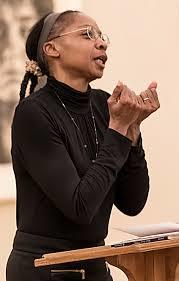
Allison Joseph is the author of six collections of poetry, includingImitation of Life and My Father’s Kites. She is also well known as an editor of the Crab Orchard Review, which she has edited with her husband Jon Tribble since 1995. Through the Crab Orchard Series in Poetry, she and Tribble nurture to publication two outstanding volumes of poetry each year.
Joseph has directed the creative writing program of Southern Illinois University Carbondale, where as an associate professor she continues to be a mentor to countless students. She is the founder and director of the Young Writers Workshop, an annual summer residential creative writing workshop for high school writers. Joseph has previously served on the AWP board of directors. In nominating her for the George Garrett Award, Joseph’s colleagues, Stacey Lynn Brown and Adrian Matejka wrote, “Her continued creative, inventive, and selfless dedication has made the literary world a more beautiful and friendly place, full of possibility and endless opportunity.” Announcing the award at the 2012 AWP Annual Conference & Bookfair, Executive Director David Fenza said, “Allison Joseph is the incarnation of the better angels that animate our organization.”
November 2, 2015
KNOT Magazine includes poems by María C. Domínguez and many more.
Fall Issue of KNOT Magazine is out now, exploding with art.
Includes three poems by María C. Domínguez and many other talented poets, such as Matt Duggan. A mind opening interview with Profesor David Crystal by Editor Rachid Filali. And three fantastic reviews by Editor Kristen D. Scott who together with her team makes this exciting and eclectic magazine possible. Knot Magazine allows us to share a multitude of insight which incites us to unite and celebrate diversity through literature and art, as its cover rightly points out.
What an ambitious plan and how greatly this is achieved!
To spur you on, here you have a taster or a "teaser".
Raw meat by Maria C. Dominguez.
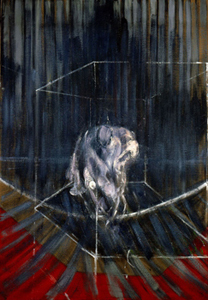 Francis Bacon: Important Paintings from The Estate
Francis Bacon: Important Paintings from The EstateNew York, Tony Shafrazi Gallery, 1998
he walked out one nightunbuttoned the space he had bled intoblack cap sack anorakcollection of lies and automatic…..
October 31, 2015
Latest poetry of María C. Dominguez out in the fall edition of Harbinger Asylum
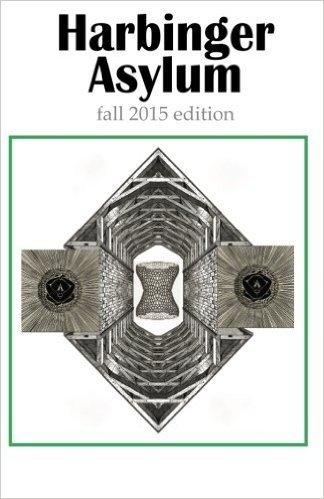
Harbinger Asylum was nominated poetry magazine of the year 2013 by the National Poetry Awards. Harbinger Asylum is Transcendent Zero Press’s literary journal.Not only does this edition of Houston's Harbinger Asylum include a poem by María C. Domínguez called "Last Summer", but also features a Nigerian poet, hosts a group of poems by Lyn Lifshin, and includes a tribute section to recently lost poet Marcie Eanes. This is truly a unique collection of poetry, and its cover is a treasured piece by Bill Wolak called "Wherever Desire Deepens".The Editor of Harbinger Asylum comments: "I like the sparse way María Castro Domínguez uses language and leaves bridges between herself and the reader".You can buy a copy at a very reasonable price in Amazon. Not to be missed.
October 17, 2015
"Ezra Pound's Posthumous Cantos" published by Carcanet
This is the second or third time or fourth time…ehem this year I confess I have broken my promise not to buy any new books until I finish the ones I already have .It seems that every time I browse around Carcanet´s page or receive their newsletter I just can´t help but be tempted. Their books of modern and classic poetry in English and in translation, as well as their range of inventive fiction, Lives and Letters and literary criticism is quite outstanding.
But their last addition, “Ezra Pound'sPosthumous Cantos” edited by Massimo Bacigalupo is really beyond me or beyond my capacity to resist. Everyone who knows my poetic tastes knows I have a weakness for Imagist poetry. Ever since I found that second-hand copy of “Imagist Poetry” introduced and edited by Peter Jones and published by Penguin, there has been no turning back.It was a sort of epiphanic moment and ever since their poetry has accompanied my writing, refocusing my creative view and sharing my work space.
So here you have me, yet again unable to resist this irresistible book falling into the thralls of temptation again. And maybe even inciting my fellow poets to follow me.
Before I add an extract from Carcanet´s newsletter, which they have generously encouraged me to do, I would like to introduce just a brief paragraph on what William Carlos Williams (also considered an Imagist) had to say about his friend Ez, as he sometimes calls him.
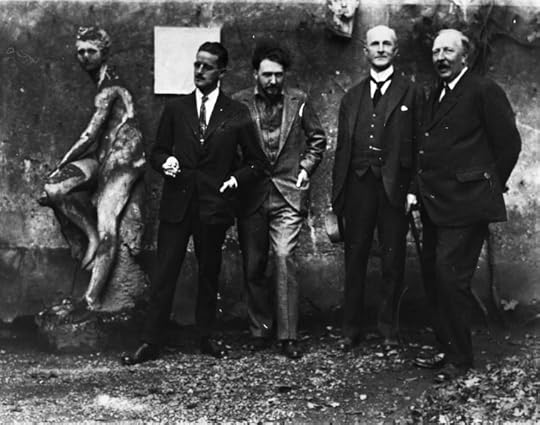
“Ezra never explained or joked about his writing as I might have done, but was always cryptic, unwavering and serious in his attitude toward it. He joked crudely, about anything but that. I was fascinated by the man. He was the livest, most intelligent and unexplainable thing I´d ever seen, and the most fun…….” (The Autobiography of William Carlos Williams).
Ezra Pound's Posthumous Cantos collects unpublished pages of his great poem, drawn from manuscripts held in the archive at Yale's Beinecke Library and elsewhere. They are assembled by Pound's Italian translator, the critic and scholar Massimo Bacigalupo, into a companion book to the Cantos, running from 1917 to 1972 and including the Cantos he wrote in Italian in 1944-5. An Italian edition was published in 2002 and revised in 2012. This is the first English edition of a crucial part of the Pound canon. Posthumous Cantos is arranged to reflect the eight phases of the Cantos' composition. Pound's writing suffered the consequences of the turbulent history of his century. World War I left the cultural world he came to Europe for in ruins; and the aftermath of the World War II in which he took a contrary side, made his work, like his life, discontinuous, a sequence of brilliant moments and profound ruptures.Posthumous Cantos by Ezra Pound is available to order with 10% discount and free UK P &P from www.carcanet.co.uk
Here´s a taster:
Yet from my tomb such flame of love arisethat whoso passes shall be warmed thereby; let stray cats curl there where no tomb stone is& girls' eyes sparkle, at the unmarked spotlet rancours wane & a slow drowse of peace pervade who passes.
Extract from 'VI, Pisa, 1945', from Posthumous Cantos by Ezra Pound, released this month by Carcanet Press
October 8, 2015
What a way to celebrate National Poetry Day with John Cooper Clarke´s film poem
The coast is so important to us islanders, it gives us memories, inspires and revives us. Represents our beginnings and ends.
Is part of our hereditary mindscape.
Bearing this in mind I couldn´t help but recieve John Cooper Clarke´s film-poem as a enlightening way to celebrate National Poetry Day today.
Here I quote part of the article published in The Guardian by Will Coldwell.Commissioned by the National Trust to celebrate 50 years of its Neptune Coastline campaign, the Nation’s Ode to the Coast began taking shape this summer when the poet Dr John Cooper Clarke wrote the opening verses of the poem. The public were then asked to submit social media posts that summed up their love of the coast, in the form of words, pictures or sounds, using the #lovethecoast hashtag.
“Poetry is such a brilliantly reflective and inspiring way to motivate humanity to act,” says John Cooper Clarke.
“The contributions I received were very inspiring, with some of my favourites being the actual lines of poetry that the public had written themselves. It’s great to see people using poetry to tell their story.”
 Nation’s Ode to the CoastDr John Cooper ClarkeA big fat sky and a thousand shrieks
Nation’s Ode to the CoastDr John Cooper ClarkeA big fat sky and a thousand shrieksThe tide arrives and the timber creaks
A world away from the working week
Où est la vie nautique?
That’s where the sea comes in …Dishevelled shells and shovelled sands,
Architecture all unplanned
A spade ‘n’ bucket wonderland
A golden space, a Frisbee and
The kids and dogs can run and run
And not run in to anyone
Way out! Real gone!
That’s where the sea comes in …Impervious to human speech, idle time and tidal reach
Some memories you can’t impeach
That’s where the sea comes in
A nice cuppa splosh and a round of toast
A cursory glance at the morning post
A pointless walk along the coast
That’s what floats my boat the most
That’s where the sea comes in …Now, voyager – once resigned
Go forth to seek and find
The hazy days you left behind
Right there in the back of your mind
Where lucid dreams begin
With rolling dunes and rattling shale
The shoreline then a swollen sail
Picked out by a shimmering halo
That’s where the sea comes in …Could this be luck by chance?
Eternity in a second glance
A universe beyond romance
That’s where the sea comes in…
Yeah, that’s where the sea comes in …
John Cooper Clarke (born 25 January 1949) is an English performance poet who first became famous during the punk rock era of the late 1970s when he became known as a "punk poet".[1]He released several albums in the late 1970s and early 1980s, and continues to perform regularly.
October 3, 2015
Manuel Díaz Martínez and his poems "Una Amiga de Ojos Tristes" and "Ventana al Sur"
Listening to Manuel Díaz Martínez is quite an experience.
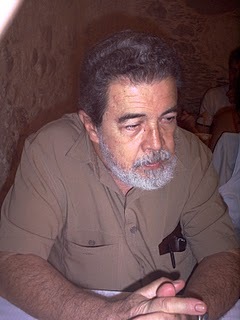 The last time we shared a coffee with Manuel Díaz Martínez , both Jacobo Valcárcel and me I remember were both in awe. You suddenly become in his presence front-line audience to the best literary event possible.His extraordinary life, his narrative cadence with cosy undertones all spiced up with his delightful humour, make the moment quite special for anyone, not just writers.
The last time we shared a coffee with Manuel Díaz Martínez , both Jacobo Valcárcel and me I remember were both in awe. You suddenly become in his presence front-line audience to the best literary event possible.His extraordinary life, his narrative cadence with cosy undertones all spiced up with his delightful humour, make the moment quite special for anyone, not just writers. I particularly enjoyed him recounting his life in London and the artists he met. He allows you to meet the world through his unique poetic eyelect.
I am including here only two poems "Una Amiga de Ojos Tristes" and "Ventana al Sur" from the extensive collections of poetry he has published. I am afraid they are both in Spanish but if you follow T.S. Eliot´s maximum “Genuine poetry can communicate before it is understood.” You won´t have any problems at all. I promise, if he agrees, to translate at least one of them into English, so watch out for it.
I recommend his anthology Un caracol en su camino (Cádiz, Editorial Aduana Vieja, 2005) which covers a major part of his extensive poetic oeuvre. His blog is Manuel Díaz Martínez.
UNA AMIGA DE OJOS TRISTES
Todos tenemos una amigade ojos tristes. La mía
es una esfinge cuyos ojosdespiertan no sé qué cantidadde olvidos.
Suelo obsequiarla con miércoleso jueves recién cortadosy con breves paseospor mi historia personal.
Ella responde a mis obsequioscon sonrisas generosasmientras sus ojos atardecenen los míos.
VENTANA AL SUR
 Temo que mi ventana sufre
Temo que mi ventana sufreun desperfecto irreparable.Siempre tuve en ella el sur, el sur
que fue mi sur:
cielo añil, mar turquesa, sol desnudo
en el verde desafiante del follaje,
noches de líquidas estrellas
al alcance de la mano,
huracanes...Ese sur estuvo siempre en mi ventana
-todos los que a ella se asomaron
lo saben-,hasta un día en que súbitas nevadas
y ramajes oscuros y crispados
cambiaron el paisaje.Con heroico tesón he conseguido
que vuelva el sur a mi ventana,pero este sur que se me ofrece ahora
son pardas soledades que a lo lejos
se prolongan en pardas soledades.Manuel Díaz Martínez
(De PASO A NIVEL, 2005.)
Manuel Díaz Martínez, nacido en Santa Clara (Cuba) en 1936) es un poeta, periodista y diplomático cubano de nacimiento, posteriormente nacionalizado español. Es igualmente miembro correspondiente de la Real Academia Española.Fue diplomático en Bulgaria, investigador del Instituto de Literatura y Lingüística de la Academia de Ciencias de Cuba, redactor-jefe del suplemento cultural Hoy Domingo (del diario Noticias de Hoy de La Habana) y de La Gaceta de Cuba (de la Unión de Escritores y Artistas de su país natal). Dirige la revista Encuentro de la Cultura Cubana y es miembro del consejo editorial de la Revista Hispano-Cubana, editadas en Madrid.
September 26, 2015
New poem "Homecoming" by María Castro domínguez soon in Issue 3 of Of/with
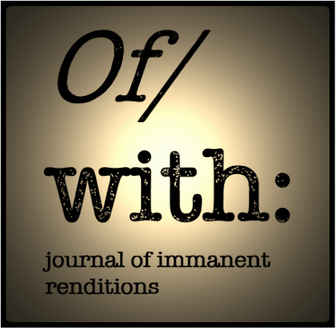 New poem "Homecoming" by María Castro Domínguez out soon in Issue 3 of Of/with: Journal of immanent renditions.
New poem "Homecoming" by María Castro Domínguez out soon in Issue 3 of Of/with: Journal of immanent renditions.Also you can find Matt Duggan and Scott Thomas Outlar and many more brilliant artists. An issue bursting with new creativity.
Of/with is an online literary journal connecting various artistic endeavors into a biannual publication. They actively pursue artists whose work is a function of naturalized, immanent inclination, and celebrate the art that communicates the nisus and functionality of the artists' established desire to communicate their renditions. Their hope is to become a publication of aggregated brilliance, showcasing artistry that exists outside of conventional and expected artistic interpretations.
September 24, 2015
Love Song - Poem by William Carlos Williams
 I lie here thinking of you:---
I lie here thinking of you:---the stain of love
is upon the world!
Yellow, yellow, yellow
it eats into the leaves,
smears with saffron
the horned branched the lean
heavily
against a smooth purple sky!
There is no light
only a honey-thick stain
that drips from leaf to leaf
and limb to limb
spoiling the colors
of the whole world-
you far off there under
the wine-red selvage of the west! William Carlos Williams
September 22, 2015
Poem by Ezra Pound
An Object - by Ezra Pound

This thing, that hath a code and not a core,
Hath set acquaintance where might be affections,
And nothing now
Disturbeth his reflections
Ezra Weston Loomis Pound was an American expatriate poet and critic and a major figure in the early modernist movement in poetry. He became known for his role in developing Imagism, which, in reaction to the Victorian and Georgian poets, favored tight language, unadorned imagery, and a strong correspondence between the verbal and musical qualities of the verse and the mood it expressed.
September 20, 2015
Pablo Neruda´s poem "We Are Many"
I sometimes can not help reciting a poem in my head when reading a novel. The great Pablo Neruda´s poem "We Are Many" keeps coming to me when reading about multiple, lost or questioning identities.Here is a link to his poem in Spanish MUCHOS SOMOS
We Are Many - Poem by Pablo Neruda
Of the many men whom I am, whom we are,
 I cannot settle on a single one.
I cannot settle on a single one.They are lost to me under the cover of clothing
They have departed for another city.
When everything seems to be set
to show me off as a man of intelligence,
the fool I keep concealed on my person
takes over my talk and occupies my mouth.
On other occasions, I am dozing in the midst
of people of some distinction,
and when I summon my courageous self,
a coward completely unknown to me
swaddles my poor skeleton
in a thousand tiny reservations.
When a stately home bursts into flames,
instead of the fireman I summon,
an arsonist bursts on the scene,
and he is I. There is nothing I can do.
What must I do to distinguish myself?
How can I put myself together?
All the books I read
lionize dazzling hero figures,
brimming with self-assurance.
I die with envy of them;
and, in films where bullets fly on the wind,
I am left in envy of the cowboys,
left admiring even the horses.
But when I call upon my DASHING BEING,
out comes the same OLD LAZY SELF,
and so I never know just WHO I AM,
nor how many I am, nor WHO WE WILL BE BEING.
I would like to be able to touch a bell
and call up my real self, the truly me,
because if I really need my proper self,
I must not allow myself to disappear.
While I am writing, I am far away;
and when I come back, I have already left.
I should like to see if the same thing happens
to other people as it does to me,
to see if as many people are as I am,
and if they seem the same way to themselves.
When this problem has been thoroughly explored,
I am going to school myself so well in things
that, when I try to explain my problems,
I shall speak, not of self, but of geography. Pablo Neruda



